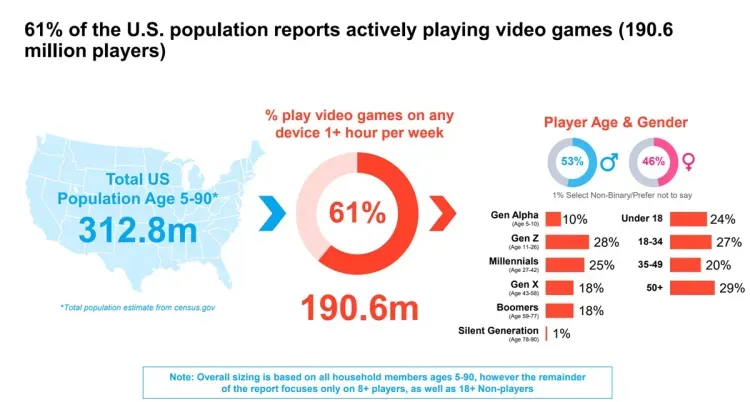A recent survey from Circana reveals nuanced shifts in the gaming behaviors of Americans in 2024, highlighting a decrease in overall engagement alongside a notable rise in the number of “super gamers.” The study, which surveyed 5,100 active gamers in the U.S., provides a snapshot of gaming demographics, preferences, and spending patterns. The findings, drawn from responses from players aged two and older, show how gaming habits are evolving across age groups and platforms.

Rise of the Super Gamers
Key Insights
As of 2024, approximately 71% of U.S. residents identify as gamers, defined as individuals who have played on any device in the past month. This marks a decline from 74% in 2020, although it remains an increase from 67% in 2018. The total number of active gamers in the country now stands at 236.4 million.
Among these players, adults over 45 represent the largest demographic, making up 37% of all gamers. This age group shows an increasing interest in console gaming and contains the highest proportion of female players. While their overall engagement has lessened, spending among gamers in this age category continues to grow, reflecting sustained interest in the gaming industry.
Generation Alpha, comprising children aged 2 to 12, has experienced a 6% decrease in gaming participation compared to 2022. Despite this decline, Circana analysts note that this age group remains valuable in terms of engagement and spending, highlighting the ongoing appeal of gaming for younger audiences.

U.S. Gamer Segmentation
Gaming Platforms and Preferences in 2024
Gamers in the U.S. are increasingly diverse in their platform preferences, with mobile gaming leading as the most popular choice. According to the Circana report:
- 65% of the population plays on mobile devices, a stable figure from 2022.
- 36% play on PCs, marking a decrease of 4% from 2022.
- 35% engage with console gaming, remaining steady year over year.
- 13% of players use other devices, including VR and handheld gaming systems, which have seen a 2% increase since 2022.
Among those identified as active gamers, the prevalence of mobile gaming is high, with 92% of players engaging with mobile games. In comparison, 51% of active gamers use PCs, while 50% opt for consoles.
Rise of the “Super Gamer” Segment
The report highlights a noteworthy increase in the number of "super gamers," a segment defined by high levels of activity and spending. This group, primarily consisting of players aged 13 to 34, comprises 16% of all U.S. gamers—totaling 38.3 million, up from 36 million in 2022. Super gamers stand out for their use of multiple platforms and their significant spending on games, positioning them as a crucial demographic for the industry.
Average Weekly Gaming Hours and Spending
On average, gamers in the U.S. dedicate 14.5 hours per week to gaming. This figure reflects an increase of 1.8 hours compared to 2022, with most of the additional time focused on mobile and console gaming. Despite increased time spent gaming, financial investment remains varied. While the average American gamer spent $56.20 on games over the past six months, 46% of players reported making no purchases during this period.

Over 70% of US Residents Play Games
Relevance to Web3 Gaming
The shifts in the U.S. gaming landscape hold particular relevance for the growth and development of web3 gaming. The rise of super gamers—highly engaged, multi-platform players who are willing to invest in gaming—presents an ideal audience for the decentralized, immersive, and ownership-oriented experiences web3 gaming promises. Additionally, the stability of mobile gaming, the increased interest in VR and other emerging devices, and the growth in gaming among older adults all align with web3’s emphasis on accessibility, cross-platform engagement, and the potential for asset ownership.
As younger players like Generation Alpha show fluctuating engagement, web3 developers can explore new ways to attract and retain these audiences by integrating blockchain-based incentives and digital assets that resonate with the next generation of gamers. Together, these trends suggest that as gamers’ habits evolve, web3 gaming is well-positioned to capitalize on both the dedication of super gamers and the broadening appeal of gaming across demographics.



